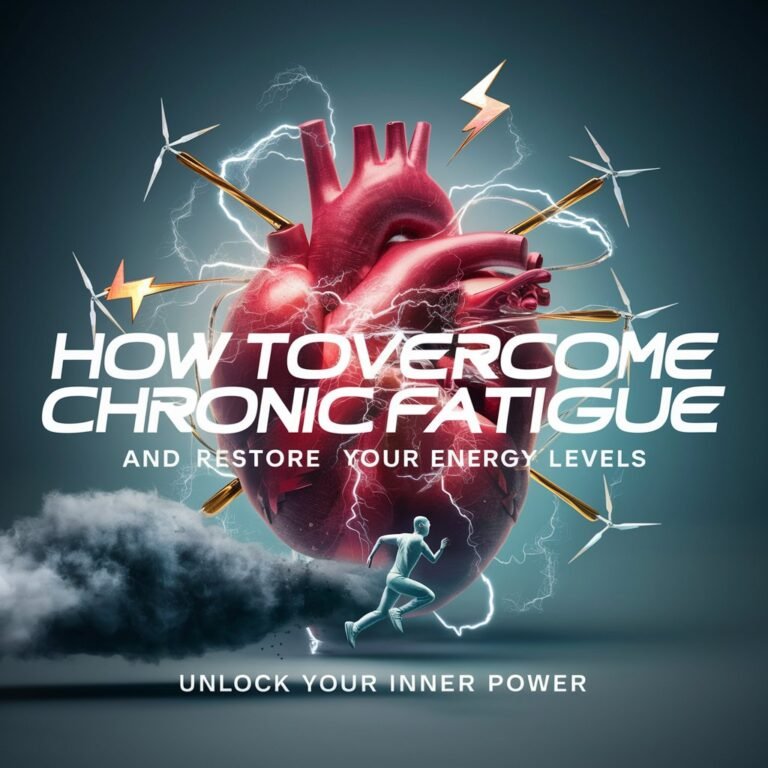How to Overcome Chronic Fatigue and Restore Your Energy Levels
A Comprehensive Guide to Reclaiming Your Vitality
Chronic fatigue can be a debilitating condition that affects your quality of life, productivity, and overall well-being. In this comprehensive guide, we’ll explore effective strategies to combat chronic fatigue and help you regain your energy and vitality. Whether you’re dealing with persistent tiredness or looking to optimize your energy levels, this article provides valuable insights and actionable steps to transform your life.
Understanding Chronic Fatigue
Chronic fatigue is characterized by persistent tiredness that doesn’t improve with rest. It can be caused by various factors, including:
- Medical conditions (e.g., thyroid disorders, chronic fatigue syndrome)
- Lifestyle factors (poor sleep habits, excessive stress)
- Nutritional deficiencies
- Hormonal imbalances
- Chronic infections
- Medications
Did You Know?
Chronic fatigue affects up to 2.5 million Americans, with women being 2 to 4 times more likely to be diagnosed than men.
Key Strategies to Overcome Chronic Fatigue
1. Optimize Your Sleep
Quality sleep is crucial for energy restoration. Implement these sleep hygiene practices:
- Maintain a consistent sleep schedule, even on weekends
- Create a relaxing bedtime routine (e.g., reading, gentle stretching)
- Ensure your bedroom is dark, quiet, and cool (60-67°F or 15-19°C)
- Limit screen time at least 1 hour before bed
- Avoid caffeine and alcohol close to bedtime (ideally 4-6 hours before sleep)
- Invest in a comfortable mattress and pillows
Sleep Optimization Tip:
Try the “4-7-8” breathing technique before bed: Inhale for 4 seconds, hold for 7 seconds, and exhale for 8 seconds. Repeat 4 times to promote relaxation and better sleep.
2. Manage Stress Effectively
Chronic stress can deplete your energy reserves. Try these stress-reduction techniques:
- Practice mindfulness meditation for at least 10 minutes daily
- Engage in regular exercise (aim for 150 minutes of moderate activity per week)
- Try deep breathing exercises or progressive muscle relaxation
- Consider yoga or tai chi for mind-body balance
- Seek support from friends, family, or a therapist
- Practice time management and prioritization techniques
3. Adopt an Energy-Boosting Diet
Your diet plays a crucial role in energy production. Focus on:
- Eating balanced meals with complex carbohydrates, lean proteins, and healthy fats
- Incorporating energy-rich foods like nuts, seeds, and fatty fish
- Staying hydrated throughout the day (aim for 8-10 glasses of water)
- Avoiding processed foods and excessive sugar
- Eating smaller, more frequent meals to maintain stable blood sugar levels
- Including a variety of colorful fruits and vegetables for essential nutrients
4. Exercise Regularly
While it may seem counterintuitive when you’re fatigued, regular exercise can significantly boost energy levels:
- Start with low-intensity activities like walking or swimming
- Gradually increase intensity and duration
- Include both cardio and strength training exercises
- Consider gentle exercises like yoga or tai chi
- Aim for at least 150 minutes of moderate exercise per week
- Incorporate short bursts of activity throughout the day (e.g., taking stairs, desk exercises)
Exercise Tip:
Try the “10-minute rule”: Commit to just 10 minutes of exercise. Often, you’ll feel energized and want to continue once you’ve started.
5. Address Nutritional Deficiencies
Certain nutrient deficiencies can contribute to fatigue. Consider getting tested for:
- Iron
- Vitamin B12
- Vitamin D
- Magnesium
- Omega-3 fatty acids
- Zinc
Always consult with a healthcare professional before starting any supplement regimen.
6. Practice Energy Management
Learn to conserve and allocate your energy effectively:
- Prioritize tasks and focus on what’s most important
- Take regular breaks throughout the day (e.g., 5 minutes every hour)
- Use energy tracking tools or apps to identify patterns
- Learn to say “no” to non-essential commitments
- Delegate tasks when possible
- Implement the “Pomodoro Technique” for improved focus and energy management
7. Explore Mind-Body Techniques
Mind-body practices can help reduce fatigue and increase energy:
- Practice mindfulness meditation
- Try progressive muscle relaxation
- Engage in guided imagery exercises
- Consider acupuncture or acupressure
- Explore biofeedback techniques
- Practice gratitude journaling
8. Limit Energy Drains
Identify and minimize factors that may be depleting your energy:
- Reduce time spent on social media and excessive screen use
- Limit exposure to negative news or stressful content
- Evaluate relationships and set boundaries with energy-draining individuals
- Declutter your physical environment
- Simplify your schedule and commitments
- Practice digital detox periods
9. Stay Hydrated
Dehydration can significantly contribute to fatigue. Ensure you’re drinking enough water throughout the day:
- Aim for at least 8 glasses (64 ounces) of water daily
- Increase intake during hot weather or physical activity
- Consider herbal teas or infused water for variety
- Monitor urine color as an indicator of hydration (pale yellow is ideal)
- Set reminders to drink water regularly
- Eat water-rich foods like cucumbers, watermelon, and zucchini
10. Consider Professional Help
If chronic fatigue persists despite lifestyle changes, consult a healthcare professional. They may recommend:
- Blood tests to check for underlying conditions
- Sleep studies to identify sleep disorders
- Cognitive Behavioral Therapy (CBT) for managing fatigue
- Medications or treatments for specific underlying causes
- Referral to a specialist (e.g., endocrinologist, rheumatologist)
- Comprehensive fatigue management program
Natural Remedies and Supplements
Some natural remedies and supplements may help boost energy levels. Always consult with a healthcare provider before trying new supplements:
| Supplement/Remedy | Potential Benefits | Considerations |
|---|---|---|
| Ashwagandha | May reduce stress and fatigue | Can interact with certain medications |
| Rhodiola Rosea | May improve mental fatigue and cognitive function | May cause dizziness or dry mouth in some people |
| Coenzyme Q10 | Supports cellular energy production | May interact with blood thinners |
| B-Complex Vitamins | Essential for energy metabolism | High doses can cause side effects |
| Ginseng | May reduce fatigue and improve cognitive function | Can interfere with blood sugar control |
| L-Carnitine | Aids in fatty acid metabolism and energy production | May cause nausea or stomach discomfort in some individuals |
| Cordyceps | May improve exercise performance and reduce fatigue | Limited long-term safety data available |
Tracking Your Progress
Monitoring your energy levels and the effectiveness of your strategies is crucial:
- Keep an energy journal to track daily energy levels and activities
- Use a fitness tracker to monitor sleep patterns and physical activity
- Regularly assess your mood and stress levels
- Note any changes in symptoms or overall well-being
- Schedule regular check-ins with your healthcare provider
- Use energy tracking apps to identify patterns and triggers
Lifestyle Adjustments for Long-Term Energy Management
In addition to the strategies mentioned above, consider these lifestyle adjustments for sustained energy improvement:
- Establish a consistent routine: Regular sleep-wake cycles and meal times help regulate your body’s internal clock.
- Create an energizing morning ritual: Start your day with activities that invigorate you, such as light exercise, meditation, or a nutritious breakfast.
- Optimize your work environment: Ensure proper lighting, ergonomic seating, and regular movement breaks to maintain energy throughout the workday.
- Practice time-blocking: Allocate specific time slots for different activities to manage your energy more effectively.
- Engage in hobbies and social activities: Enjoyable activities and social connections can provide a natural energy boost.
- Limit caffeine intake: While caffeine can provide a temporary energy boost, excessive consumption can lead to crashes and disrupt sleep patterns.
- Incorporate power naps: Short naps (15-20 minutes) can be refreshing without interfering with nighttime sleep.
- Practice gratitude: Focusing on positive aspects of life can improve mood and increase overall energy levels.
- Engage in nature therapy: Spending time outdoors and in natural settings can help reduce stress and boost energy.
- Implement a digital sunset: Reduce exposure to blue light from devices in the evening to improve sleep quality.
When to Seek Immediate Medical Attention
While chronic fatigue is often manageable with lifestyle changes, certain symptoms warrant immediate medical attention:
Warning Signs:
- Sudden, severe fatigue accompanied by shortness of breath or chest pain
- Extreme fatigue along with fever, chills, or signs of infection
- Fatigue accompanied by unexplained weight loss or gain
- Severe fatigue following a head injury
- Fatigue associated with thoughts of self-harm or suicide
- Sudden onset of severe fatigue with no apparent cause
- Fatigue accompanied by severe muscle weakness or paralysis
If you experience any of these symptoms, seek medical help immediately.
Frequently Asked Questions (FAQs)
Conclusion
Overcoming chronic fatigue and restoring your energy levels is a journey that requires patience, consistency, and a multifaceted approach. By implementing the strategies discussed in this guide, you can take significant steps towards reclaiming your vitality and improving your quality of life. Remember that everyone’s experience with fatigue is unique, and it may take time to find the combination of approaches that works best for you.
Don’t hesitate to seek professional help if your fatigue persists or significantly impacts your daily life. With the right support and strategies, it’s possible to manage chronic fatigue effectively and rediscover your energy and zest for life.

